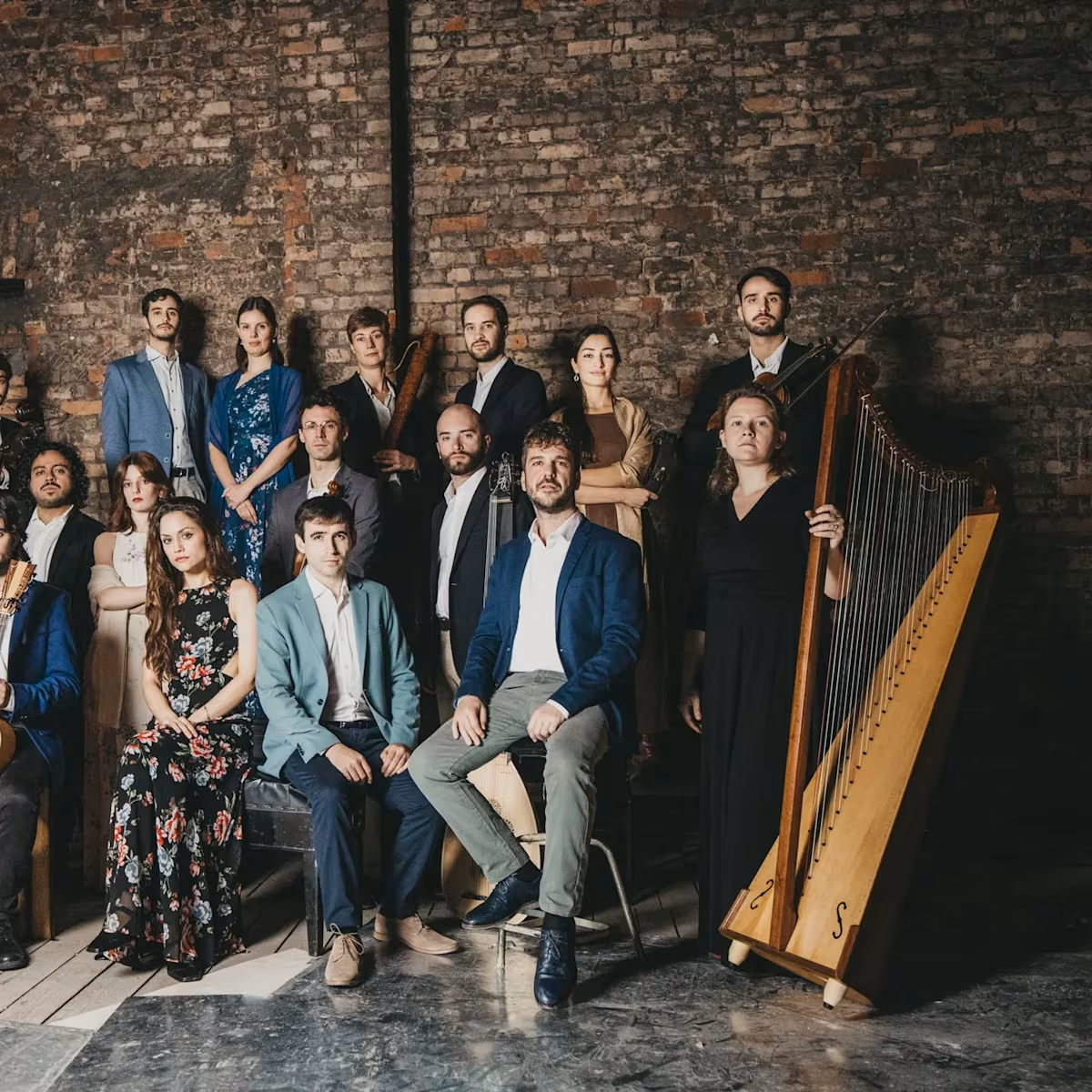Feature
The Excellence of Women
A musical discovery, and a recording
Share this

FIRST PUBLISHED 03 AUG 2024
Imagine juggling with five batons. Difficult!
It’s just as tricky to juggle with five musical lines if you’re a composer - and it’s quite rare to discover lost music in five parts, especially if it's more than 400 years old. Rarer still for the composer to be a woman, for there are relatively few women composers from the 16th and 17th centuries known today. The newly re-assembled five-part madrigals of just such a rarity - Maddalena Casulana - form the central part of a project by Fieri Consort, drawing on the research and important musicological discoveries of Professor Laurie Stras.
Music by two composers has been recorded by Fieri Consort in their new album, The Excellence of Women - namely Barbara Strozzi and Maddalena Casulana. Of the two composers (and they were both also renowned as singers), Strozzi is best known today. She was born into an artistic milieu, an illegitimate child of Giulio Strozzi, one of the most influential intellectuals of the day in Venice. He referred to her as his “adoptive daughter” and helped her establish a career as a musician after she had grown up surrounded by artists, poets, musicians, and other intellectuals of the Accademia degli Incogniti. It was a prolific musical career - Strozzi published eight volumes of her compositions, and is believed to have had more secular music in print than any other composer of the era. This was a considerable achievement, all the more so that it was achieved without support from the Church or (other than the encouragement of her father and the other Incogniti) patronage from the nobility.
Strozzi’s work, along with that of fellow virtuosi Fontei, Ferrari, Kasperger, and Monteverdi, has previously been recorded by Fieri Consort in their Virtuosa of Venice album (their third). In the new album, The Excellence of Women, Strozzi’s music and, indeed, words are celebrated alongside Maddalena Casulana’s madrigals.
Casulana’s five part madrigals had, until quite recently, been unperformable, as while they were known to have existed, several parts were missing. Music of the era wasn’t set out in a “full score” as in later centuries, but was printed or hand-written only in partbooks. A set of her Primo libro de madrigali a cinque voci (her “First book of madrigals in five voices”, featured on the Fieri album), had been listed in the library in Gdánsk, but two of the parts (the Canto and Alto) disappeared - presumed looted - during the Second World War.
Missing, that is, until Professor Laurie Stras of the University of Southampton discovered two books by Casulana in a recently-digitised catalogue of the Russian State Library in Moscow. She soon realised that these were the partbooks missing from the Gdánsk library (indeed, they still bore the Gdánsk catalogue numbers!) - and she was able to reassemble a complete edition of the music, published in 2023.
Five-voice writing is an achievement (perhaps like five-baton juggling…) confined to the realms of compositional mastery, as Stras describes (in an interview with the EBU):
“I have made important discoveries before, but this one excites me in a unique way. While we knew that Casulana had composed five-voice works, our appreciation of her has been based entirely on her four-voice madrigals. They are accomplished, no doubt, but they reside in the world of song – most are easily realized as solo song or duet.
“The five-voice madrigals, however, show Casulana was a true master of polyphony, and that she was also able to create large musical architectures through harmony and texture. They reveal her to be absolutely equal, if not superior, to her contemporaries and worthy of the praise she inspired.”
Casulana - who left at least 66 madrigals - is a somewhat mysterious figure, more so than Strozzi. She was celebrated in her lifetime as a composer (also as a singer and a teacher), and some of her admirers even dedicated books to her. But to be able to compose to such a standard as to attract that kind of admiration - and in five parts, which requires technical as well as artistic virtuosity - must have involved expert tuition and a background steeped in music. Frustratingly, however, we know almost nothing of her early life, and can only speculate: perhaps she came from a family of musicians? Perhaps her family had retained a gifted music tutor?
It’s thought that she was born at Casole d’Elsa, near Siena (judging by her name, Casulana). By inference from the writing of her admirers' dedications and the few of her own words to survive, we can surmise that she received some musical education and experience in Florence, where she produced her first published work, four madrigals in a collection named Il Desiderio. Later, she was active in Venice, where her own complete first book was published in 1568: Il primo libro di madrigali. As yet, though, these were madrigals in four voices only.
Florence during the time in which Casulana was musically active was dominated politically by the powerfully independent figure of Isabella de’ Medici, the preeminent “First Lady” within the Medici family from 1562 until her death in 1576. It appears that Casulana may have encountered Isabella - or at least, was keen to win her favour, for she dedicated her First Book of Madrigals to her.
Isabella de’ Medici was her supremely wealthy and influential family’s chief representative in the key city-state of Florence. She notably took a separate residence to her husband, for example, and kept her maiden name, all the while playing host to the nobility of Europe. Overshadowing even the Florentine sovereign Duchess Eleonora, she was reputedly considered by many as “the real grand duchess”.
Maddalena Casulana’s dedication seems intended to win the heart (and perhaps scudi) of de’ Medici, therefore:
"I know truly most excellent Lady, that these first fruits of mine, flawed as they are, cannot produce the effect that I desire, which would be in addition to providing some evidence of my devotion to Your Excellency, also to show the world the futile error of men who believe themselves patrons of the high gifts of intellect, which according to them cannot also be held in the same way by women. Because of all this, I did not wish to fail to publish them, hoping that in Your Excellency's bright name they would achieve such light as might kindle some other, higher talent to succeed more clearly in that which except for the spirit, I have not been able to show."
Venice, April 10, 1568.
from Your Excellency’s most humble servant,
Maddalena Casulana.
It is not clear if Isabella de’ Medici was impressed. Nevertheless, Casulana went from strength to strength and published further books of madrigals in 1570, 1583, and 1586. She attracted praise and promotion from the leading composers of the age, including Lassus (i.e. Orlando di Lasso) and Philippe de Monte. It is the 1583 book, Primo libro de madrigali a cinque voci, that is central to Professor Stras’ discovery and Fieri Consort’s new recording.
Casulana’s compositional legacy therefore continues to resonate today - all the stronger thanks to the scholarship of Professor Stras and the musicianship of Fieri Consort - and is now once again available for us to enjoy in print and on recording.
The album has received much praise, including this review from Early Music America and being selected for the list of ‘best classical albums of 2024 so far' in The Times.
Share this
Keep reading

Harpsichord Masterclass Series with Nathaniel Mander
Take your early keyboard playing to the next level with this 16-part online masterclass series led by international harpsichordist, Nathaniel Mander.

Cantoría | ‘A la fiesta, zagales’: Spanish Baroque at Wigmore Hall
Cantoría leads listeners into a vibrant Spanish festive world filled with the joyful energy of Baroque villancicos, carols, jácaras and dances.

Carnival spirit at The Vache
Ashutosh Khandekar reviews Vache Baroque’s recent production of ‘Le carnaval de Venise’ by André Campra.



